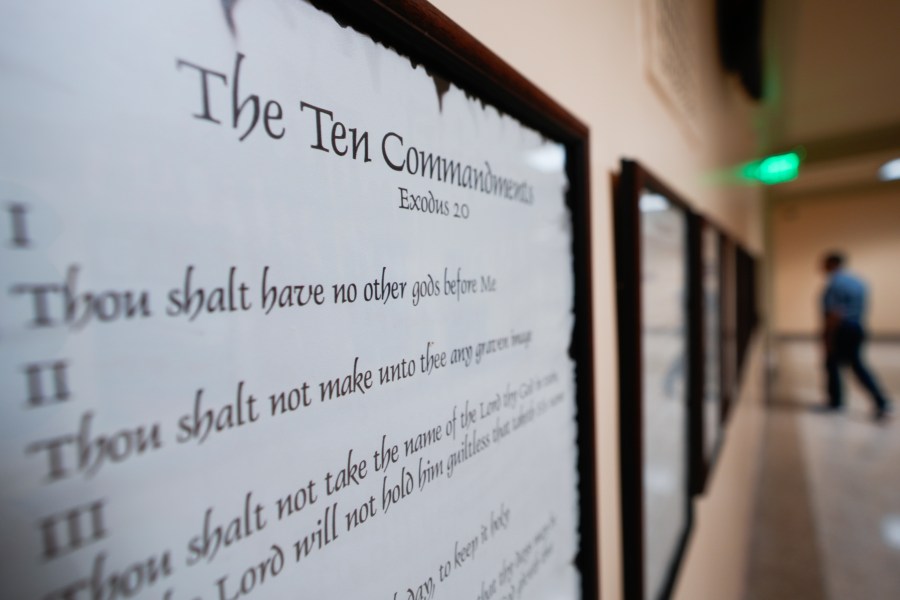SIOUX FALLS, S.D. (KELO) – A bill that would require all South Dakota classrooms to display the Ten Commandments is one step closer to becoming law.
After nearly two hours of testimony and debate, the House Education Committee voted 8-7 to pass Senate Bill 51. It will now move to the House floor and if passed, be sent to Gov. Larry Rhoden’s desk.
Immigration bill is Rhoden’s first new law as governor
“When you think about the overall corrosion of our kids and society’s issues that they’re dealing with… I don’t think it’s necessarily a bad idea to start having conversations with kids about their moral stance and where that could help guide them in the future,” Republican Rep. Tesa Schwans said. “I think we should give it a chance and at least give it a shot.”
The bill would require every classroom in South Dakota to display an 8 by 14 inch poster with the Ten Commandments on it, along with another document that explains other circumstances where the decalogue was present in schools. Curriculum on the subject must be taught at least three times; once in elementary, middle and high school.
Supporters maintain the bill isn’t aimed at religious indoctrination, but rather to highlight the historical significance the Ten Commandments had on the foundation of America.
“We based all of our laws (on it), the Supreme Court has it on the wall. I think that it would not hurt anything to have this in our schools,” Republican Rep. Travis Ismay added.
Grace Sergeant, a college student in Brookings, agreed. During her proponent testimony, Sergeant said she would have liked to have been taught about the Ten Commandments in her history class when she was in school.
“I see the Ten Commandments as a moral framework for the laws we have today and see their display and teaching to be nothing but a reminder of simple morals that are nothing but beneficial for us as humans to remember,” Sergeant said.
In a committee hearing earlier in the session, lawmakers questioned how and who would pay for the displays in every single South Dakota classroom. One of the bill’s prime sponsors, Republican Sen. John Carley, explained on Friday both in-state and out-of-state organizations have offered to pay for all the displays.
When asked by Republican Rep. Lana Greenfield who the donors were, Carley said they wished to remain anonymous, to which Greenfield said would “cause a problem.”
Greenfield also expressed her frustrations for school districts consistently taking the blame and responsibility for student behavior and “failing kids.”
“When the students have no food, somebody always comes in and helps pay for it,” she said. “Now, when the students are not properly taught by their parents any kind of religious instruction, now the schools have to take over. I mean, where does it end?”
Also in opposition was Republican Rep. Mike Stevens, who was worried about the state stepping over local control.
“We’re trying to be the school board of South Dakota here in Pierre by once again mandating things to our schools that are not necessary, that they can decide themselves,” Stevens said.
Multiple pastors also spoke out against the bill, asserting that the Ten Commandments are religious moral guidelines and not historical documents.
Concerns about mature subject matter like adultery and murder being present in elementary classrooms was a prominent point of discussion.
“Why is my daughter in kindergarten having the word adultery put on her classroom wall? Why is the word murder on her classroom wall,” questioned Sam Nelson, a lobbyist for the Sioux Falls School District. “That’s a ‘me’ thing to talk about, and I’d like you to keep it that way.”
Carley argued young children are already exposed to those themes on the school bus with older kids and in the media they watch. He said the Ten Commandments in classrooms would provide an outlet for teachers and students to discuss those topics in an age-appropriate way.
A similar bill was passed in Louisiana last year and contested in court. Although the Louisiana Attorney General gave the OK for schools to display the signs, the case is still tied up in the 5th Circuit Court for a few schools.
Those in opposition believe the case will inevitably be brought to the U.S. Supreme Court and are worried about passing a similar bill in South Dakota that would open the state up for potential legal battles.




